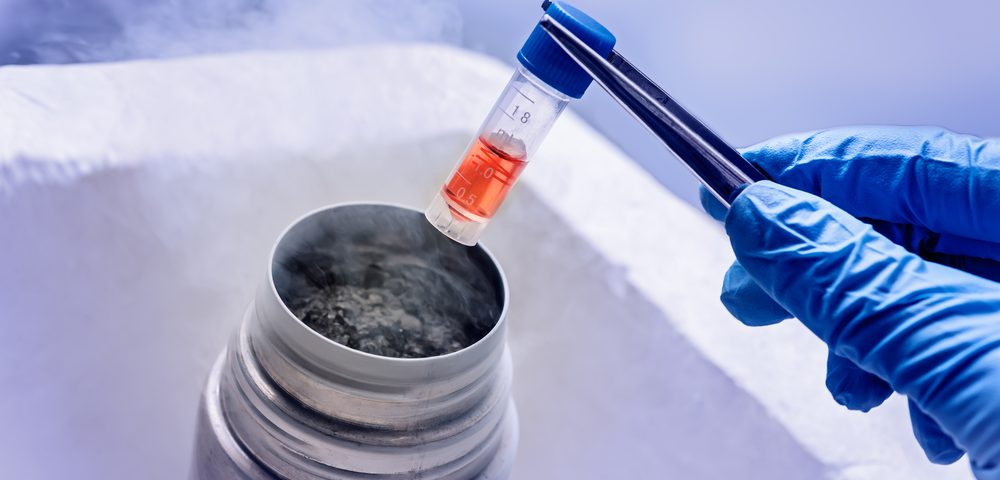A new type of immunotherapy may be a promising approach for acute myeloid leukemia patients whose disease has progressed despite treatment, according to the results of a small clinical trial developed at Washington University School of Medicine.
The study, “Cytokine-induced memory-like natural killer cells exhibit enhanced responses against myeloid leukemia,” published in Science Translational Medicine, delves into the possible therapeutic benefit of using natural killer (NK) cells that are laboratory-primed to better attack cancer cells and to respond by releasing cancer-fighting substances.
Nine acute myeloid leukemia (AML) patients were treated with the primed NK cells and assessed at designated times for response to the treatment. Researchers found measurable health improvement in 50% of the participants: one month following treatment, four were in complete remission, and one matched the criteria for partial remission while testing positive for reappearance of abnormal cells. The remaining four participants, who did not respond to treatment, did not get worse.
“This phase 1 trial primarily was designed to test the safety of the new therapy,” Todd A. Fehniger, MD, PhD, the study’s senior author and co-principal investigator, said in a press release. It is noteworthy that the nine patients involved were unresponsive to other leukemia treatments and had exhausted alternative options prior to entering this clinical trial. Complete remission lasted for as long as about six months — twice the survival time usually found in unresponsive patients with active AML, researchers reported.
“These are patients with very poor prognoses and very few options” Fehniger said, adding, “[m]any of these patients are older and are not candidates for traditional bone marrow transplantations because of the side effects associated with such an aggressive treatment.”
This therapeutic approach could prove a paradigm shift for AML patients undergoing chemotherapy, which tends to increase their susceptibility to opportunistic infections on account of a weakened immune system’s innate response.
Key to the success of this particular immunotherapy — previous attempts have averaged a 6 percent response rate — seems to be the way NK cells were pre-activated before being administered to the patients. NK cells are innate immunity cells that naturally respond to infections, and have been shown to break down some cancer cells without exogenous medical inducements.
The researchers’ experimental approach, based on Fehniger’s previous work, consisted in purifying NK cells from the blood of a donor who is closely related to the patient, and then exposing the cells to a combination of three chemical signals: interleukin (IL)-12, IL-15, and IL-18. This treatment activated the NK cells and enhanced their ability to fight the leukemia cells upon injection in the patient’s bloodstream.
Rizwan Romee, MD, a co-principal investigator and the study’s first author, said the approach mirrors that of military training. “You can think of the activation period in the laboratory as a sort of boot camp, exposing the cells to some of the conditions and signals they will encounter in the patient’s body. So when the NK cells see the real cancer for the first time, they remember their training and respond more effectively than cells that don’t have this exposure.”
While the results are too premature and observed in too small a patient pool to be substantial, the ever-growing body of similar evidence supports the promotion of immunotherapy over conventional treatments for leukemia and other blood-related disorders.
“We are cautiously optimistic about these results,” Fehniger concluded, while emphasizing the importance of considering each patient’s variability in response to immunotherapy.
Even though the rate of remission was dose-dependent, Fehniger — who set up the experiment to be dose escalating — said that these initial patients received the lowest doses of cells so investigators could carefully monitor for potentially toxic side effects.
“We saw remissions at each dose level, even the lowest one. Now that we have established the safety of this immunotherapy, we would like to find out how consistently the patients respond when we treat a large number at the highest dose level, which is what we’re in the process of doing now,” he said.
Fehniger’s team, supported by the Siteman Cancer Center at Barnes-Jewish Hospital and the Washington University medical school, is now planning to take on two major issues in immunotherapy: new ways to enhance NK cells, and testing this immunotherapy in pediatric patients with relapsed AML.


